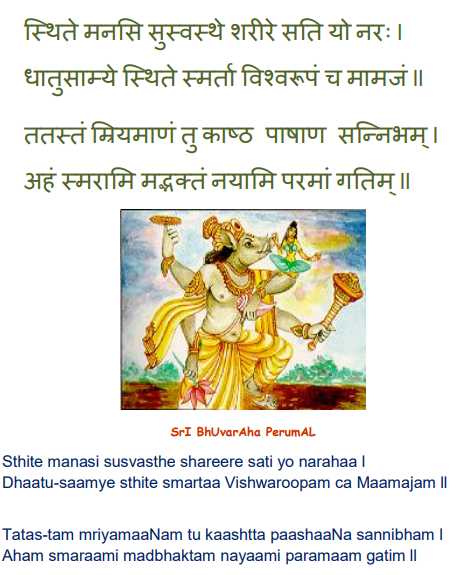Charama Shlokam - Varaha Charama Shlokam
- Vishnu Sreenivas
- Dec 29, 2019
- 2 min read
In the Vedanta school of thought, three shlokas stand out as a guiding factor to the three philosophies of Dvaitha, Advaitha and Visishta Advaitha. These three shlokas are referred to as charama shlokas.
The word charama in Sanskrit translates to ultimate or the total extreme. These shlokas are of such high regard as these were shlokas rendered by Lord Sriman Narayana in different situations but hold a very significant and common purpose. One can find three charama shlokas namely, 1) Varaha Charama Shlokam, 2) Rama Charama Shlokam and 3) Krishna Charama Shlokam. The three charama shlokas form the basis for the Sri Vaishnava school of thought as given to us by Sri Ramanujacharya.
Now we shall see the Varaha Charma Shlokam, its story, and it's meaning.
The Varaha Charma Shlokam can be found in the Varaha Puranam. The Varaha Puranam is one of the 18 celebrated Puranas of Indian literature. The Varaha Puranam is a conversation between Lord Varaha and Bhoodevi as the Lord lifts Bhoodevi from the ocean of deluge after defeating Hiranyaksha.
The Varaha Charama Shlokam is as follows,
Now to see the meaning of these two shlokas.
Lord Varaha addresses Mother Earth or Bhoodevi (who expresses concern for the well being of all Her children):
If anyone thinks of Me, when the mind is sound (sthite manasi), with the body in good health (suswasthe shareere), and with all mental and physical faculties working perfectly and intact (dhaatu saamye sthite) - thinks that I am indeed the very cause of this universe (or the form of this universe, vishwaroopam), that I am without birth (ajam) - then I assure (You, Devi) that I will remember this devotee of Mine when he/she is on his/her death bed, lying (helplessly) like a stone or a log of wood, and personally take him/her to the Supreme Abode.
The doctrines of karma establish the laws that govern each jeevaathma. The aathma dwells in the body which includes the senses and the mind. At death, when the soul departs from the body, it takes with it a load of character as developed by the activities it has so far undergone in its human host. This makes a start for its next host. As established by bhakti yogam, for one to achieve salvation, they must think of the Lord in their end moments. In the age of Kali Yugam, where people find it difficult to follow the established doctrines established in the scriptures Bhoodevi in her emotional attachment for all those borne by her to reach Vaikuntham and end the cycle of life, asks the Lord what has to be done. The Lord then tells her to end the cycle of rebirth, one must perform sharanagati or unconditional to the Lord. If one unconditionally surrenders to the Lord and fails to remember him in his/her last moments, then the Lord himself will remember that jeevaathma and grant the soul salvation.




Comments